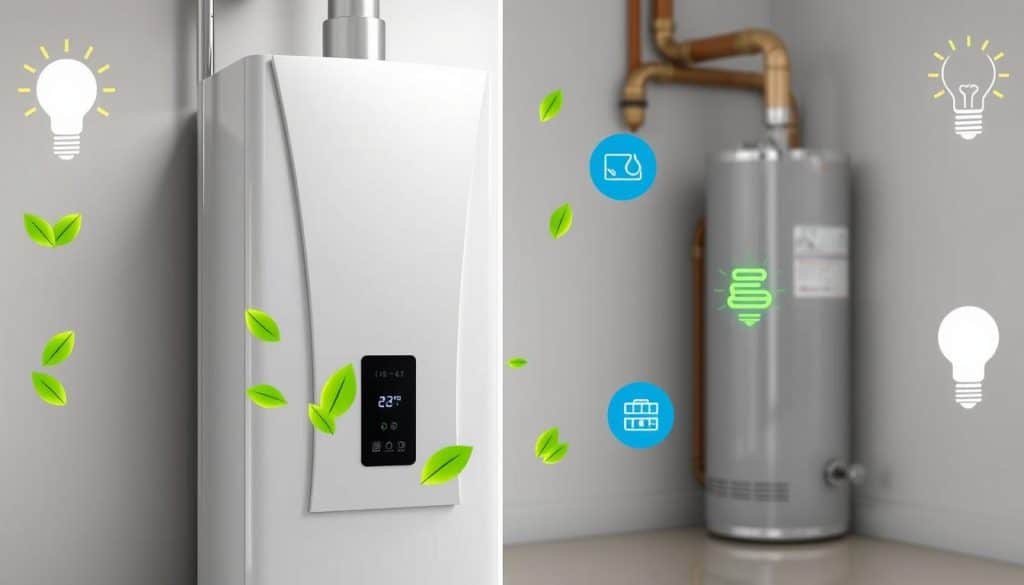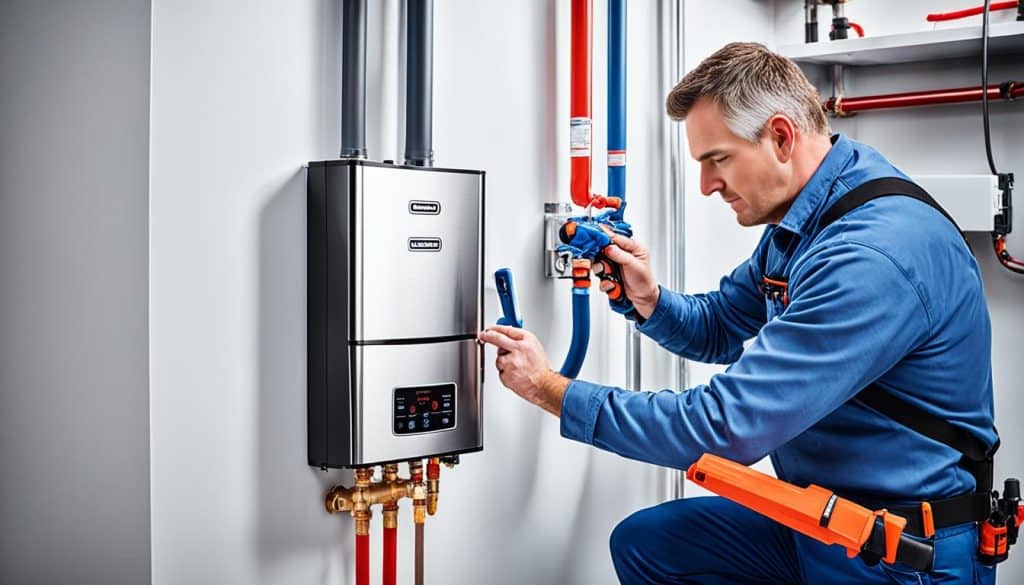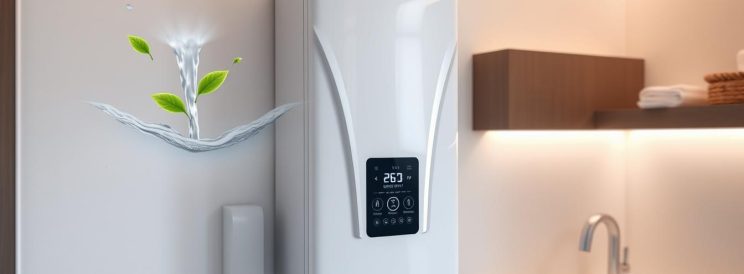Ever thought if Should I Install a Tankless or Traditional Water Heater? With new tech in home appliances, the debate between tankless and traditional water heaters is more important than ever. Knowing the benefits of tankless water heaters compared to traditional ones is key.
In this guide, we’ll look closely at both systems. We’ll explore their good points and possible downsides. Whether you prefer the endless hot water of tankless models or the trusty reliability of traditional ones, we’ve got the info you need. For expert plumbing services, J Sewer & Drain Plumbing Inc. in Chicago, IL, offers help. Call them at (773) 968-2704 for help right away.
Key Takeaways
- Tankless water heaters heat water on-demand, offering energy efficiency and continuous hot water.
- Traditional water heaters are often easier to install and operate but might incur higher utility bills over time.
- Consider your household size and daily water usage to determine the ideal system for your needs.
- Both tankless and traditional heaters come with distinct upfront and long-term cost implications.
- The choice between tankless water heater vs traditional may also depend on your home’s plumbing capacity.
Understanding Traditional Water Heaters
Traditional water heaters have been a staple in American homes for years. They have big tanks that store hot water for when you need it. Knowing the good and bad points of these heaters is key for anyone looking at different options.
What is a Traditional Water Heater?
A traditional water heater has a big tank that holds lots of water. This water is heated by a gas burner or electric element. It keeps hot water ready for you whenever you need it. This makes it a reliable choice for many families.
Benefits of Traditional Water Heaters
One big plus of traditional water heaters is their lower upfront cost. They are cheaper to buy and easier to install. This makes them a good choice for those watching their budget. Plus, their simple design means they often have fewer parts to break, making repairs cheaper and easier.
Drawbacks of Traditional Water Heaters
However, traditional water heaters have some downsides. They use more energy because they keep the water in the tank hot all the time. This can lead to higher energy bills. They also take up a lot of space because of their big tanks. Keeping them well-maintained is important to avoid problems like sediment buildup and anode rod corrosion.
Understanding Tankless Water Heaters
Tankless water heaters have changed how we heat water at home. They give us hot water when we need it, without a storage tank. This makes them different from traditional water heaters.
What is a Tankless Water Heater?
A tankless water heater heats water as it flows, without a storage tank. When you turn on the hot water tap, cold water goes into the unit. There, a gas burner or electric element warms the water. This way, you always have hot water ready.

Benefits of Tankless Water Heaters
Tankless water heaters are very energy-efficient. They only heat water when you use it, saving a lot of energy. They also last longer than traditional heaters, with the right care. Plus, they take up less space, which is great for small homes.
Drawbacks of Tankless Water Heaters
But, there are downsides to tankless water heaters. They cost more to buy and install than traditional ones. Installing them can be tricky and needs a pro. Also, big families might need more than one unit to get enough hot water.
Comparing Tankless and Traditional Water Heaters
When looking at tankless and traditional water heaters, several important factors come into play. Traditional water heaters have a big tank that holds hot water. They are often cheaper to buy upfront and are easy to understand and fix.
But, they might use more energy, which can lead to higher costs over time. This is because they always heat water, even when not needed, which wastes energy.
Tankless water heaters, on the other hand, heat water only when you need it. This makes them more efficient. They also last longer than traditional models, which is a big plus, even if they cost more at first.
Another thing to think about is how hard they are to install. Traditional water heaters are usually easier to set up. But, tankless models might need changes to your plumbing and electrical systems. Still, they can save you money on energy bills in the long run.
In the end, choosing between tankless and traditional water heaters depends on what matters most to you. Reviews often praise tankless for their energy efficiency and long-term savings. But, traditional water heaters might be better if you want to save money upfront and prefer a simpler setup.
Should I install a Tankless or Traditional Water Heater?
Choosing between a tankless or traditional water heater depends on your situation. This includes your budget, how much hot water you use, and the space you have. Tankless heaters are great for small spaces and saving energy. Traditional heaters need more room and upkeep but are cheaper to install.
Think about your household size, hot water use, and long-term costs. Tankless heaters cost more upfront but save money over time. Plus, rebates can help lower the initial cost, making them a good choice for those watching their budget.
Traditional heaters are cheaper to start but cost more in the long run. They need regular maintenance and use more energy. Choosing wisely can improve your heater’s efficiency and lifespan, whether it’s tankless or traditional.
Talking to a pro like J Sewer & Drain Plumbing Inc in Chicago, IL, is a good idea. They offer expert advice and installation services. By looking at costs, rebates, and other factors, you can pick the best option for your home.
Costs and Installation Considerations
When looking at your options, it’s key to understand the costs and what’s needed for installation. This is true for both tankless and traditional water heaters.
Upfront Costs
The cost of a tankless water heater is often higher at first. This includes the price of the unit and extra parts for setup. Traditional water heaters, however, cost less upfront but might not offer the same energy savings as tankless models.
Installation Complexity
Installing a tankless water heater can be more expensive. You’ll likely need a pro, especially if your plumbing and electrical systems need updates. This can increase the initial cost of a tankless unit. Traditional water heaters, by contrast, are easier and less expensive to install.
Long-term Costs and Savings
Even though a tankless water heater costs more at first, you could save a lot in the long run. They use less energy, which means lower operating costs. Plus, you might get rebates or incentives for going energy-efficient, which can help cover some of the initial cost.
Impact on Your Plumbing System
Both tankless and traditional water heaters affect your home’s plumbing system. Traditional units fit well with existing plumbing, making installation easy. This is because they match the plumbing setup for similar appliances.

Tankless water heaters, however, might need big changes or even a new plumbing setup. You might need to resize pipes or add more units for hot water. These changes can make installation more complex and costly.
Before choosing, get a plumbing system check from a skilled plumber. This step is key to see if your plumbing needs changes. It helps ensure your water heater works well and avoids future problems.
Assessing Your Hot Water Usage Habits
Figuring out how much hot water you use is key when choosing between tankless and traditional water heaters. Knowing how much hot water your home needs helps pick the best option for heating water efficiently.
Household Size and Water Demand
The size of your household is a big factor in choosing a water heater. Big families often need traditional water heaters because many appliances use hot water at once. But, smaller homes or apartments might do better with tankless water heaters since they use less hot water.
Choosing the right water heater size means everyone gets hot water when they need it. This also helps save on energy costs.
Daily Hot Water Usage Patterns
How you use hot water every day is also important. It’s good to know when you use the most hot water and your usual daily routine. For example, if everyone showers at the same time, a traditional water heater might be better.
But, if you use hot water at different times, a tankless water heater could be more efficient. Knowing your hot water usage helps pick the right water heater size for your home.
Conclusion
Choosing between a tankless or traditional water heater is a big decision. It involves looking at costs, space, efficiency, and how much you use it. Each option has its own benefits, and what’s best for you depends on your specific needs.
Thinking about long-term savings and performance is crucial. A more efficient system can save you money and make your life easier. Whether you choose a tankless unit for instant hot water or a traditional one, both can improve your home’s comfort.
In Chicago, J Sewer & Drain Plumbing Inc. can help you decide. They offer expert advice and reliable installation. Their warranties ensure your new water heater will be a great addition to your home. Making the right choice and using hot water wisely can make your home smarter and more comfortable.






